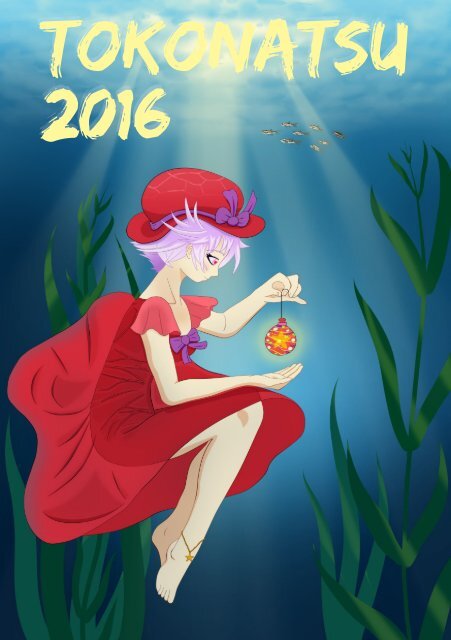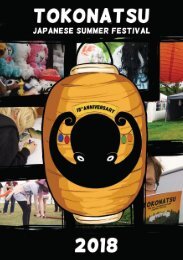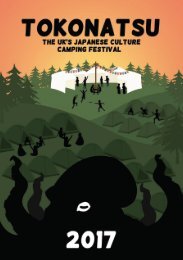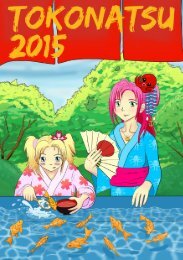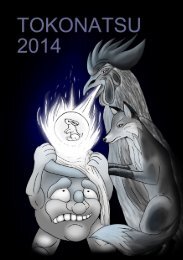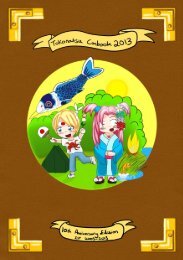Tokonatsu Conbook 2016
A collection of articles, artwork and details from the 2016 festival
A collection of articles, artwork and details from the 2016 festival
Create successful ePaper yourself
Turn your PDF publications into a flip-book with our unique Google optimized e-Paper software.
TOKONATSU<br />
<strong>2016</strong>
Editor’s letter<br />
Welcome to the <strong>2016</strong> <strong>Tokonatsu</strong> convention booklet. I have received a selection of<br />
wonderful submissions this year, an insight into teaching in Japan, artwork<br />
revolving around the event and fantasy themes, and also a touching article about<br />
<strong>Tokonatsu</strong> itself.<br />
This year <strong>Tokonatsu</strong> has undergone some major changes. There is now a new house<br />
system. The houses Red Phoenix, Blue Dragon, Green Turtle and Orange Tiger will<br />
carry on from year to year, rather than new houses every year. Also in order to<br />
expand and improve, the event is no longer fully catered for by <strong>Tokonatsu</strong>.<br />
Breakfast is still included and will be available every morning, however for the rest<br />
of the day food vans will visit the campsite and the tuck shop will also be open at<br />
various times as well. The main building used for HQ, will now also be used as an<br />
arcade and video games room, which I’m very much looking forward to.<br />
There is also a local pub down the road, that I took shelter in during the<br />
thunderstorm last year. After assembling a tent in the rain which is not an<br />
experience I care to repeat, a good hot meal can make all the difference. Luckily the<br />
weather improved as the weekend progressed.<br />
Hoping for a storm free <strong>Tokonatsu</strong> this year.<br />
Hayley Warner<br />
(<strong>Conbook</strong> Editor)<br />
SPECIAL THANK you TO MVM<br />
<strong>Tokonatsu</strong> would like to thank MVM for their continued support and for providing<br />
the anime that will be shown at this year’s event. They have also kindly sent DVDs<br />
to be won as prizes. Please check out their online shop at www.anime-on-line.com<br />
2
INDEX<br />
Page 1 – Cover<br />
Page 2 – Editor’s Letter and Special Thank You to MVM<br />
Page 3 – Index<br />
Page 4 – Gaijin Life in the Countryside (Sam Haley)<br />
Page 8 – <strong>Tokonatsu</strong> Houses (SketchieGambit)<br />
Page 10 – <strong>Tokonatsu</strong> Night & Day (Abigail Horn)<br />
Page 12 – A place that feels like home (Sean Tooman)<br />
Page 14 – Team Red Phoenix Banner (Abigail Horn)<br />
Wasp (Razorwind)<br />
Page 15 – Daydreamer (K. BASS ART)<br />
Page 16 – Map of <strong>Tokonatsu</strong><br />
Links to Artists Websites<br />
hayleywarner.carbonmade.com<br />
SketchieGambit.deviantart.com<br />
www.facebook.com/kbassart<br />
3<br />
<strong>Tokonatsu</strong> 2015 by Russell Fenton
adjusting to life teaching English in rural japan<br />
There is something about visiting Japan as a foreigner – or “gaijin” – that many of<br />
us have probably experienced whilst there, no matter the length of the visit. We are<br />
visually different. In cities like Tokyo or Osaka, there is a buzz of busy human life;<br />
yet unlike the UK, it is the white who are in the minority. Every Asian appearance is<br />
assumed to be a Japanese resident (and unsurprisingly so, when only a stunning<br />
1.22% of the Japanese population are foreign residents) and people of any other<br />
racial background are scarce.<br />
When I first stepped off my flight after landing in Narita and a wave of humid<br />
summer heat spread over my tired eyes, I knew that this wasn't going to be the<br />
same as life at home in the UK. I was embarking on a journey which I don't think I<br />
was quite fully prepared for, as evidenced by me breaking down into tears when I<br />
finally reached my hotel bed. Looking out of the window at the concrete jungle of<br />
Tokyo was an overwhelming feeling. This was<br />
my first time in Japan, and I'd be staying here<br />
for a year. Alone.<br />
Two days of gruelling lectures, life advice and<br />
Japanese language study tips ensued. I was<br />
swallowed by the humidity as, even in the<br />
hotel, it seemed as if Japanese people feared<br />
to use their AC lest the energy police come<br />
and shout at them for not sweating to death<br />
like the rest of the country. But then it came;<br />
the day where we all got shipped off to our<br />
new homes for the year, the day everyone<br />
had been waiting for. I hopped on the Joetsu<br />
line bullet train to my new prefecture,<br />
Niigata.<br />
4
When I arrived, I was greeted at the station<br />
by some of the staff from my Board of<br />
Education, and two of my three fellow gaijin<br />
co-workers. We drove past mountains and<br />
hills, rice paddy after rice paddy until we<br />
reached my new hometown, Tokamachi.<br />
Tokyo had tourists, this place had none.<br />
Tokyo had English speakers, this place had<br />
barely any. The elderly gathered crops in the<br />
summer haze while school students clad in<br />
uniform wandered by.<br />
People in the inaka – or “countryside” –<br />
although they couldn't speak a word of<br />
English, smiled and said good morning. They<br />
asked me questions about where I come<br />
from and welcomed me to their town, hoped<br />
that I would try their local food, join in with<br />
their community and have fun at their<br />
festivals. So I got stuck in.<br />
One cannot underestimate the initial<br />
struggles of daily life in a country where you don't speak the language. I'd studied<br />
enough to squeeze out a “yoroshiku onegaishimasu” in front of my head teachers,<br />
but I was not prepared for the effect of not being able to read anything beyond<br />
basic Japanese would have on my life. Everything from reading road signs to being<br />
5
able to tell the difference between milk and drinking yoghurt became a task for my<br />
online dictionary. It is amazing how many times you'll be told your Japanese is good<br />
for being able to answer basic questions. People in the inaka really love to hear you<br />
speak their language. It's kind of a boost to hear when you're on your way to go fill<br />
out forms at the bank with kanji you don't understand again.<br />
Much the same as I struggled with Japanese, my school children all really struggled<br />
to communicate with me in English. I guess I expected a higher level of English, but<br />
why should they speak English when Japanese is the only thing people speak<br />
around them? That's when it really set in that my job was more a job of inspiration<br />
than of practical English teaching, and that is definitely something that people who<br />
are interested in English teaching in Japan should bear in mind. There is a reason<br />
they don't seek out people with excellent Japanese for these positions – that is their<br />
school teacher's job.<br />
One of my job duties as an English assistant teacher under our city's Board of<br />
Education was to go to as many elementary schools as possible for a one-off daylong<br />
“culture visit”, as they called them. As a result, I got to meet lots and lots of<br />
young Japanese kids, who looked at me<br />
as if I was the strangest thing on their<br />
tiny Japanese-centred planet (and I quite<br />
possibly was!) I was often greeted with<br />
shouts of “TALL” or “WHOA BLUE EYES”<br />
whilst wandering the corridors of<br />
various schools.<br />
In my culture visits, I would talk a little<br />
about the UK, myself and then finally I'd<br />
let the kids ask me any questions for five<br />
or so minutes. I did the same lesson<br />
every time, so I got a little better at<br />
understanding their Japanese questions<br />
and responding to them instead of<br />
relying on my teachers to translate. Of<br />
course, everyone who's spent any time<br />
with children will know that kids will ask<br />
anything they can if they're not limited<br />
by rules, so naturally I didn't impose any<br />
for maximum hilarity. Often these<br />
questions were the standard favourites<br />
of Japanese kids: “are you married?”,<br />
“how old are you?” or even “how many<br />
6
children do you have?” (none!) But once or twice<br />
you get the odd wild card. My favourite thus far,<br />
from a third year elementary school girl, was: “Are<br />
the UK preparing for war?” Myself and the other<br />
teachers in the room were pretty stumped by that<br />
one. Am I even well-informed enough to answer<br />
that question? I mean, the UK could be preparing<br />
for war. Who am I to reassure this small Japanese<br />
child? Maybe I looked like someone who came to<br />
Japan to spread war propaganda. I quickly moved<br />
onto the next child who asked me what my<br />
favourite colour was.<br />
When I first pitched my tent at <strong>Tokonatsu</strong> in the<br />
summer of 2008, I didn't realise just how far my<br />
interest in Japan would take me – even further<br />
than Middlesbrough to Milton Keynes and back, which, at the time, was the longest<br />
journey I'd done in a few years. The friends and memories I've made there over the<br />
years have truly nailed this festival in place in my heart. I hope that you too get to<br />
explore and enjoy Japan in your lifetimes. It's definitely worth the trip.<br />
By Sam Haley<br />
Photos including header: Hanami (Flower Viewing) in Takada Park (also pages 5 and<br />
6), Joetsu Nakano Broadway in Tokyo (page 4), Niigata City Fireworks Festival (page<br />
7).<br />
7
8
9
10
<strong>Tokonatsu</strong> 11 Night & Day by Abigail Horn
A place that feels like home<br />
I have been going to <strong>Tokonatsu</strong> since it began. As a 13 year old I was overly excited<br />
about going to an event, as I hadn’t been to any before and it was all about<br />
something I loved, anime. This was back in the time when my parents had to pay<br />
for things and I had to get their permission. I had also not been camping before so<br />
all in all, I will admit I was a bit scared. I was wondering if the people would be nice,<br />
are their people my age, what if I don’t like it and all the usual stuff when you’re<br />
doing something new.<br />
So the time came to go to Toko, I had packed everything and more, worried I<br />
wouldn’t have enough things for a weekend, and when I arrived at the site in<br />
Milton Bryan I remember it was the most glorious sunny day I had seen in ages.<br />
People setting tents up, chatting with each other and<br />
playing Frisbee. After seeing this I started to relax<br />
more. I realised that I was worried for no real reason<br />
and I just enjoyed my little holiday away from school,<br />
exams, and had my first real independent adventure. I<br />
had choices to do events or just relax with people or<br />
watch screenings in the anime tent. I honestly didn’t<br />
know what to do so I just floated around.<br />
I remember on the Sunday feeling really sad when it<br />
was the closing ceremony as the weekend was<br />
ending. I felt refreshed, had a tan and had made some<br />
new friends and was feeling really happy and told<br />
myself that I want to come again next year. So a year<br />
passes and I can’t remember how it came about but I<br />
12
ended up gophering. So for my second Toko I was helping out and remember that I<br />
ended up in the kitchen. When helping set up I distinctly remember feeling nervous<br />
about serving the food because I really didn’t know how to talk to people or how to<br />
strike up a conversation. So the time came and I remember I just kind of found<br />
something I was happy with saying, and went with it. I realised after about 20<br />
minutes I was actually doing fine and so over the course of the weekend I began to<br />
talk more with people who were gophering and the committee. I didn’t realise at<br />
the time that some of these people would become really good friends of mine, and<br />
again we came to the end of the weekend and I just wanted to keep going.<br />
Over the next few years my life takes a drastic change at home but I always looked<br />
forward to going to <strong>Tokonatsu</strong> and gophering. I actually began talking to more<br />
people and making more friends and I realised that the timid little me wasn’t there<br />
anymore. I had a place that no matter what happened in the world always felt like<br />
home. A few years down the line I felt I wanted to enjoy Toko as an attendee and so<br />
took a step down from gophering and I began to enjoy the events more. Playing<br />
Toko Disk, Otaku Royale on the odd occasion and its always funny seeing active hot<br />
fixes for games because someone broke it last time. Over this time I began to see<br />
new faces and I became a social butterfly, talking to so many people, getting to hear<br />
different stories of their triumphs and of their woes.<br />
At some point I began to realise that we are all growing up, people are starting to<br />
get careers and go off to university and buy houses. The event changes as people<br />
leave the committee and others take over and <strong>Tokonatsu</strong> continues to grow into<br />
something beautiful. As we begin to see a new wave of youngsters attend, it brings<br />
me so much joy thinking that this event could become as important to someone<br />
else like it did me. It became my sanctuary away from life, a place to rest and enjoy<br />
things with people<br />
like me, people who<br />
most of the time<br />
might be behind a<br />
screen or seeing the<br />
world. The event is<br />
nearing how old I<br />
was when I started<br />
going to it, there is<br />
such a great<br />
community spirit<br />
here that I’ve not<br />
really seen anywhere<br />
else. It been a place<br />
that’s showed me a<br />
13
world that I first thought I could never really live in and be happy but from that<br />
seed I’ve now moved from my home town and following my heart. Life feels like it’s<br />
moving at a million miles per hour but I always know where home will be.<br />
By Sean Tooman (Colmy)<br />
Photos kindly provided by Russell Fenton, Jordan Shepherd and Naomi Phillips.<br />
Team Red Phoenix Banner by Abigail Horn<br />
Wasp by Razorwind<br />
Edo font was created by Vic Fieger and used with their permission.<br />
www.vicfieger.com<br />
Legal: all content inside this booklet is the copyright of it’s respective owner. All<br />
design and editorial content is the copyright of Hayley Warner & <strong>Tokonatsu</strong>. No<br />
content, in part or in whole, may be reproduced without the permission of the<br />
original creator.<br />
14
15<br />
Daydreamer by K. BASS ART
16


